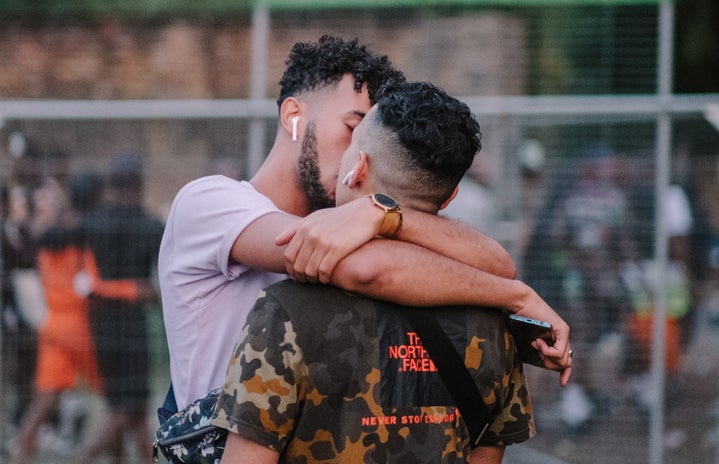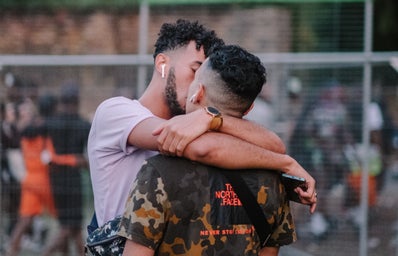Edited By: Shloka Sankar
Yaoi, also known as boys’ love (ボーイズ ラブ, bōizu rabu) and its abbreviation BL (ビーエル, bīeru), is a genre of fictional media originating in Japan that features homoerotic relationships between male characters. It is typically created by women for women and so is distinct from bara, the genre marketed to gay men, but it does also attract a male audience and can be produced by male creators.
I got into the BL genre about a year ago when I randomly came across a twitter post of two boys aggressively kissing each other- if I’m going to be all high and mighty in this essay I might as well be honest- it was the horny juice that drew me in. So, quick crash course for the babies who have no idea what BL is- it is a slowly rising media and entertainment industry in the countries of Thailand, Taiwan, Japan, South Korea, Philippines, Vietnam and China (though they prefer “bromance”) which produces shows that present a story of homoerotic love between men. There is another sub genre of GL (Girl’s Love) which is not as popular, as straight women (who are the majority of the watchers of BL) prefer to see guys in love than girls. Thailand is a power house of BL, churning out about 45 of them gay shows in 2022. They have had an exponential growth curve, especially after the genre boomed internationally during the pandemic and demand has risen up like crazy. The shows themselves are pretty simple- they have a bunch of tropes knitted together and intermixed with the occasional homophobia to give it a more “realistic” angle. They cast pretty actors with a wide range of talents (singing is a must) so that they can appeal to the “apple pie” demographic of the entertainment industry (that’s what the straight women who love rom coms are called in Hollywood).
BL or yaoi has historically been produced for straight women as a sort of erotica- it fetishizes gay men and gay romance and gives an exotic edge in order to “excite” straight women. If we are trying to analyze the “queerness” of BL today and how representation actually works now, we have to let the older stereotypes go- BL has evolved past them but has also created new monsters of its own- the crazy fans.
Ok forget BL- I know most of you who are reading this right now have, at least once in their lives, had a wattpad phase that involved a boyband (Hello, retired/hiatus Larries). Now imagine a fandom that ships two men who have already kissed (multiple times). They are crazy times infinity- they thrive on interactions between two men and have entered into such a deep parasocial relationship with the actors who they think ARE THE CHARACTERS, that it’s hard to let go now. The BL industry is no angel- they specifically manufacture their publicity events and interviews for their actors in such a way that they “imply” that the two men are dating in real life- fanservice takes a real meaning here when an entertainment industry queerbaits its audience into watching shows via implying that the actors are actually gay and in love. This is BL’s strike number one- they fetishize their actors to an insane degree in order to maintain social media interaction and increase their streaming and revenue. But the catch is this- if they didn’t do this, people would not watch these shows anymore because they don’t believe the actors are actually gay and the show suddenly seems “fake” to them. The industry as a result produces lesser shows with bad quality which reduces the variety in a genre that is already ostracized in the majority of the world. This is how fetishization paves way for representation for us queers- we need these gross, manipulative and homophobic media tactics in order to get our good shows recognition which eventually leads to better representation. It’s like winning in the long game, but losing a chunk of your soul nevertheless.
Let’s talk about Thailand now, shall we? It is quite literally a BL giant- producing gay shows that are angsty, fluffy, indie, emo, mafia/bodyguard, kinky etc etc. Sounds like a wattpad bookmark list to you? That’s exactly what it is. But it has done some great and not so great things. It has producers that are clearly lacking in the talent of their writers and dress up problematic storylines using high heat scenes that draw attention away from the icky and gross characters to the icky and not-so-gross gay sex. It also has shows that have the stupidest plots and the only thing holding it up is the chemistry between the actors. But at the same time, it produces shows that are cinematically beautiful- they have brilliant and heartbreaking stories about the intricacies of same-sex love. There have also been shows that criticize the very same toxic BL industry that birthed it. What I mean to say is- it is like every other entertainment industry ever- a mix of rotten, overripe, and unripe fruits and its up to you to pick your pick. Who knows- you might go in for 12 episodes of steamy sex and come out thinking about marriage equality in Thailand. Or a classic enemies to lovers will lead you into a rabbit hole of how it was the inbuilt heteronormativity all along.
Thailand’s leading entertainment industry right now is BL- no one watches their straight shows anymore. Their BL industry has been forced to diversify- they can’t keep producing the same lame plot over and over again because Mama USA is now watching them. This forces them to quite literally become more queer- their shows now advocate for marriage equality, safe sex, STI testing, openly speak against the government’s homophobic policy and most importantly- acknowledge their own soft power in developing Thailand’s global image. This not only represents queer people, it also gives them power- and edge over others that they never expected to have.
I remember the first time I consumed queer content- it was the book Red, White and Royal Blue by Casey Mcquiston. A charming little novel about the bestest boys falling in love with each and as I consumed that book under candlelight (not really; it was normal tubelight) I realized that heterosexual romance novels were never gonna be good enough for me- I clearly preferred more queer things. As I sit down to write this piece literally a day before the deadline, the only things I can think about is not how I can make my argument about queer representation in South Asian media factually strong or how I could best sound like a lit major. Rather, I sit on the weird little sofas in the library at night and hope- hope that one day, Asian queer media gets the recognition it deserves. Because yes, I will proceed to go on a rant about how imperfect it is- the scripts, the industry, the actors, and the fans- god, the fandom. But at the same time, it is fighting for us- with its problematic tropes and hawkish media strategies- and one day maybe a mother in India who watches these shows when her husband’s at work will treat at her child kindly when they come out to her- after all that’s what her favorite character’s mother in the sexiest BL did.


